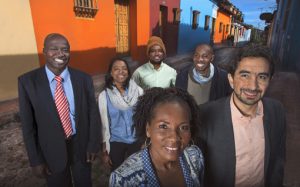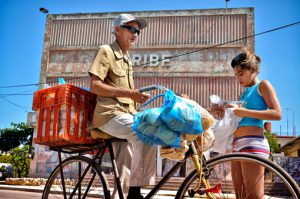
Indigenous Leaders: Recovering Indigenous Rights
This article is part of the Leaders of Social & Political Change series from the Fall 2012 issue of Americas Quarterly. View the full special section. We Indigenous peoples have made great progress in the defense of our rights and the rights of Mother Earth (Pachamama). In many countries, our rights and connection to … Read more

Gloria Bustos: Microfinance
This article is part of the Leaders of Social & Political Change series from the Fall 2012 issue of Americas Quarterly. View the full special section. Historically, Colombia’s rural southwestern region has always been one of the most diverse and economically productive, providing a large share of the country’s food. But it was also … Read more

Afro-Colombian Leaders: Recognition of Race and the Struggle to Realize Change
This article is part of the Leaders of Social & Political Change series from the Fall 2012 issue of Americas Quarterly. View the full special section. In the past 20 years, the Afro-Colombian population has gone from being nearly invisible politically to assuming a more powerful role in public discussion and politics. But we … Read more
[i]The Great Gap: Inequality and the Politics of Redistribution in Latin America[/i] edited by Merike Blofield
From the Occupy movement to the demonstrations at the G20 Summit in June, frustration over longstanding and deepening inequality is boiling over. This makes a volume exploring the politics of persistent inequality in Latin America—long the world’s most unequal region—very timely. In The Great Gap: Inequality and the Politics of Redistribution in Latin America, University … Read more
[i]The Developmental Challenges of Mining and Oil: Lessons from Africa and Latin America[/i] by Rosemary Thorp, Stefania Battistelli, Yvan Guichaoua, José Carlos Orihuela, and Maritza Paredes
The first decade of the twenty-first century has witnessed some remarkable developments: the 9/11 terrorist attacks, the rise of China, the 2008–2009 financial crisis, and the Arab Spring, just to name a few. South America’s commodity and natural resource boom should be added to that list. The buoyant market for soy beans from Argentina, oil … Read more
[i]Secretos de la Concertación: Recuerdos para el futuro[/i] by Carlos Ominami
Commentary on Chilean democracy has evolved from praise to concern since conservative President Sebastián Piñera moved into La Moneda Palace in 2010, bringing the Right to power for the first time in over 50 years. The praise was well-earned. Piñera’s victory not only showed the Right’s vote-getting ability; the peaceful alternation of power in Chile … Read more
Religion: Evangelicalism in Brazil
Although Brazil is still home to the world’s largest number of Catholics, the Evangelical Church has made huge inroads over the past 20 years. The number of Brazilians identifying as Evangelical more than doubled from 9 percent in 1991 to 20 percent in 2010, according to a joint study by the Instituto Brasileiro de Geografia … Read more
Tourism: Latin America’s Travel Boom and Challenges
Latin America’s travel and tourism industry took a hit during the 2008–2009 recession. International arrivals slowed and tourists had less money to spend. But over the longer term, tourism has been a success story—and forecasts suggest continued growth. That should surprise no one. Latin America’s sheer diversity in scenic beauty, cuisine and cultures has combined … Read more

Dispatches: Reform and Change, Cuban Style
Havana, Cuba One hot afternoon during a visit to Cuba in March 2000, a traveling companion and I hopped into a tricycle cab for a ride from the Hotel Nacional to Old Havana. The young man pedaling the cab overheard us talking and turned his head to ask, “Canadian?” “No, somos Americanos,” I responded. His … Read more

Business Innovator: Martha Debayle, Mexico
When Mexican media personality Martha Debayle gave birth to her first child 16 years ago, like many new moms, she felt “clueless about what it meant to be a mother.” To make things worse, when she looked for information in the media about parenthood, all she found were clichés and patronizing language. Other parents might … Read more

Politics Innovator: Laura Alonso, Argentina
*Watch an AQ Q&A interview with Laura Alonso. It took courage and a splash of audacity for Argentine Congresswoman Laura Alonso to oppose the nationalization of Spanish oil giant Repsol’s stake in Yacimientos Petrolíferos Fiscales (YPF), her country’s largest energy company. Her remarks in the Cámara de Diputados (Chamber of Deputies) earlier this year earned … Read more

Civic Innovator: Public Lab for Open Technology and Science, Regional
The advent of Google Maps, Google Earth and other easily accessible satellite imaging technology would seem to have made most forms of personal, small-scale cartography obsolete. But outside high-density population centers, many of the images these services provide are often out of date or nonexistent. This is especially a problem in Latin America, where unmapped … Read more

Arts Innovator: Aurora Guerrero, U.S./Mexico
“Write what you know.” It’s an age-old dictum for aspiring writers—and it applies to filmmakers, too. Aurora Guerrero, a self-defined queer Chicana, followed that rule to create Mosquita y Mari, a coming-of-age film about a friendship between two Chicana teenagers that deepens into a romance. The film, which premiered at the 2012 Sundance Film Festival, … Read more
Brazil’s economic success is based on more than the demand for natural resources.
Brazil’s economy—while it still confronts structural and policy challenges—has a solid medium-term outlook. It’s true that the economic boom, which has made Brazil the sixth-largest economy in the world, coincided with higher commodity demand, brought about by the growth of emerging economies in Asia. But Brazil’s recent success cannot be attributed just to commodities. Higher … Read more
Brazil’s reliance on commodity exports threatens its medium- and long-term growth prospects.
While Brazil’s economic performance in the past decade has made it one of the leading targets of foreign investment in the world, its success has relied heavily—even excessively—on commodity exports, mostly destined for China. Exports have grown to $256 billion, up from $118 billion in 2005, and now account for 14 percent of GDP (compared … Read more


